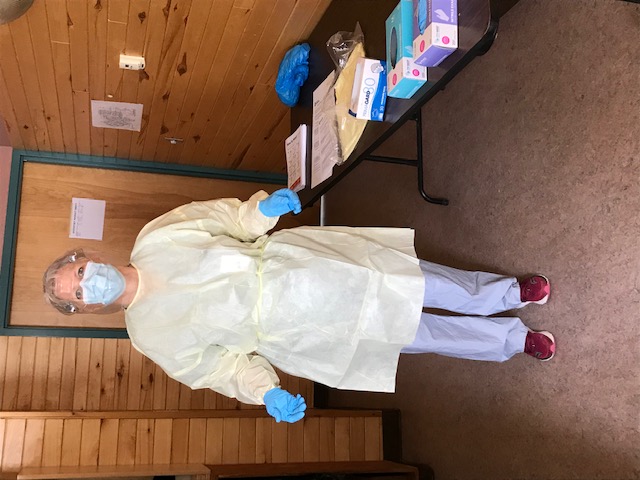Faculty of Nursing alumna volunteered during worrisome COVID-19 outbreak: ‘It was the right thing to do’

Registered Nurse Dr. June Anonson joined the frontlines to combat the COVID-19 outbreak in La Loche, Saskatchewan.
These unprecedented times under COVID-19 are plagued by uncertainty. Many are listening to the pleas from health officials to hunker down in the safety of their homes to wait out the pandemic, while others have the capacity to step up in extraordinary ways.
Dr. June Anonson, BScN ‘84, is no stranger to helping out during times of crisis; in 2009 she volunteered in northern Saskatchewan during the H1N1 outbreak, and she also assisted with evacuation and relocation efforts with the Red Cross during the 2015 wildfires. Despite the risk and the time away from her family, as COVID-19 began to spread, Anonson was eager to once again join an interdisciplinary team of health care professionals as a frontline nurse in the remote community of La Loche, Saskatchewan, located 600 kilometres northwest of Saskatoon.
Finding warmth in unexpected places
“The people of La Loche were gracious to us even though we were strangers ‘inhabiting’ their little community. We had to go to their doors and ask questions — which sometimes could be very invasive for them — but they were very polite and respectful to us, even when we couldn't answer all of their questions,” explained Anonson.
Her role as a nurse in the health response efforts for one of the most concerning outbreaks in Canada varied day-to-day, but she worked diligently with other health care professionals to minimize the spread of the virus. They monitored patients who tested positive through daily in-person home checks and phone calls, administered swabs and patient health assessments, developed processes, and handled contact tracing measures.
“One of the nurse leaders I reported to had been a previous student of mine and she was an excellent leader during this challenging time. What a fun and intriguing role reversal,” said Anonson, who currently works as a researcher and professor at the University of Saskatchewan’s College of Nursing.
Nursing built the foundation for future endeavours
Anonson has a long history in academia, especially at the University of Alberta. Nursing provides a multitude of role opportunities, which spurred her to complete her Bachelor of Nursing degree at the Faculty of Nursing. Her positive BScN experience and her desire to teach and lead in health care education motivated her to pursue her Masters (MEd ‘94) and PhD (‘02) with the Faculty of Education.
She credits the University of Alberta for honing her confidence and leadership skills while sparking a social justice that has guided her ever since.
“I have been very fortunate in my career to have some wonderful opportunities and roles, partly because of how I was prepared and supported at the U of A.”
Since then, Anonson has been profiled by the Canadian Nurses Association (CNA) as one of their 150 Nurses for Canada, becoming an ambassador for nursing.
She believes working together collaboratively and interprofessionally is essential for patient-centred care and is crucial to an effective health response against the virus. Her advice for fellow RNs on the frontlines is simple:
“You are an important piece of the puzzle but no more, no less than any other piece. You can only be successful in your efforts by relying upon and supporting each other.”
With the World Health Organization (WHO) deeming this year as the Year of the Nurse and Midwife, Dr. Anonson emphasizes how fitting it is to celebrate and support nurses during a global pandemic.
“This designation couldn't have come at a better time. Nurses more than any other profession are at the frontline 24/7 of where the risk and joy is and where we can make a difference. Nurses: be bold, be brave...now is our time to shine!”